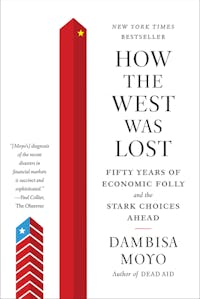How the West Was Lost
Fifty Years of Economic Folly--and the Stark Choices Ahead
 Download image
Download image
ISBN10: 0374533210
ISBN13: 9780374533212
Trade Paperback
240 Pages
$17.00
Amid the hype of China's rise to global power, the most important story of our generation is being pushed aside: how America's rapidly growing population of the unskilled, unemployed, and disaffected threatens the nation's wealth and stature.
In How the West Was Lost, the New York Times bestselling author and economist Dambisa Moyo sheds light on how a host of shortsighted policy decisions have left the economic seesaw poised to tip away from America and toward the emerging world. Faced with this impending calamity, the United States can choose either to remain open to the international economy or to close itself off, adopting protectionist policies that will give the country time and space to redress these pervasive structural problems.
Incisive and illuminating, How the West Was Lost not only exposes the policy myopia of the West that has led it onto a path of economic decline but also reveals the crucial—and radical—policy actions that must be taken to stem this tide.
Reviews
Praise for How the West Was Lost
"The sad saga of the recession gives legs to Dambisa Moyo's provocatively-entitled book, for it goes to the heart of the great economic issue of our times: how swiftly will power shift over this century?"— Hamish McRae, The Independent
"Moyo's diagnosis of the recent disasters in financial markets is succinct and sophisticated . . . I applaud her brave alarm against our economic and social complacency: her core concerns are sufficiently close to painful truths to warrant our attention."—Paul Collier, The Observer (London)
"This argument . . . can rarely have been made more concisely . . . Moyo is a very serious lady indeed."—Dominic Lawson, The Times (London)
"Dambisa Moyo, a former Goldman Sachs analyst with a doctorate from Oxford, offers up a well-reasoned look at how the world's most advanced nations are squandering their economic lead—and how they might survive by fighting Chinese fire with fire . . . Moyo doesn't lay all the blame on China. Far from it. The backbone of this book, and the best reason for reading it, is her examination of how the U.S. has lost economic ground by grossly misallocating capital, labor and technology. Moyo walks the reader through the troubling evidence of America's slide and China's ascent. The book offers Western politicians a prescription for stopping the rot."—James Pressley, Bloomberg News
"Moyo questions whether America has the political will to implement the draconian policies necessary to maintain its position as the world's leading economic superpower. Moyo theorizes a globe bifurcated between the West (aging economies possibly destined to sink like the former British Empire) and the Rest, led by China. While the rest have youthful, well-educated populations, cheap labor, and double-digit GDP, their ascension is far from guaranteed. To surpass the U.S. economy by 2027, China would have to grow at 10% a year. Alternatively, to preserve its advantage, the U.S. would need to grow more isolationist in its trading, default on government debt, and begin anew."—Publishers Weekly
Reviews from Goodreads
BOOK EXCERPTS
Read an Excerpt
PART ONE
The Way It Was
1
Once Upon a Time in the West
Once upon a time, the West had it all: the money, the political nous, the military might; it knew where it wanted to go, and had the muscle to get there....



